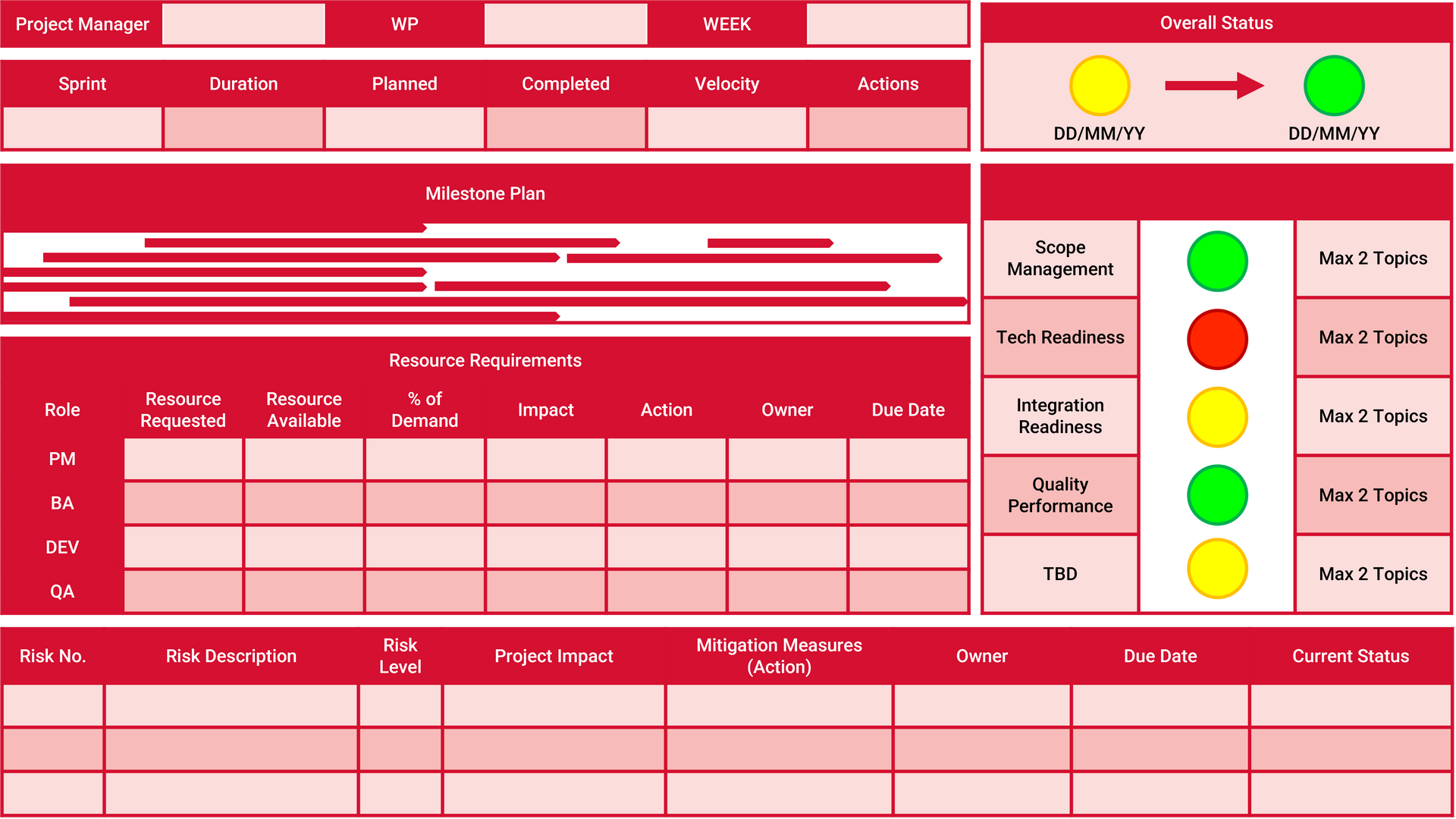Change Management - Controlling & Closing
Project Control
Having completed our planning activity and mobilised a team of dedicated professionals through a well-defined execution plan, it is now time to ensure that our hard work is reinforced by a rigorous control and status communication mechanism.
A transparent, iterative control tool helps to enhance communication, increase adaptability, promote stakeholder engagement, and contributes to the overall success of the project.
At Cambridge Management Consulting, we visualise this control mechanism as a one-page project dashboard, documenting project progress against key milestones, capturing delivery risks and maintaining adherence to project time and budgetary constraints.
A transparent communication of project status and the assignment of ownership of issue resolution helps to streamline decision making. It is therefore critical that dashboards are an objective reflection of the project reality. Far too often, project managers present an idealised version of a project, failing to identify or communicate the risks that threaten to derail an activity. Hiding issues is common, and can be for a variety of issues, which is why a rigorous control process is required to keep us on track.
The creation of a Cambridge MC project dashboard follows a 5-step process:
- Goal Definition: The change dashboard should be a reflection of the business goals and change imperative driving the activity.
- Measurement Creation: Each measurable should be defined with a benchmark created to support an objective view of progress against operational targets.
- Visualisation: A change dashboard should be an easy-to-understand visualisation of the project measures that can be shared with all levels of the organisation.
- Control: Use the dashboard to control your progress towards the change imperative, with an appropriate review and communication plan.
- Adapt: Planning and execution is by nature iterative, and therefore measures should be adapted as required and subsequently communicated across the stakeholder landscape. Resources should be onboarded or released as dictated by the evolution of the project requirements.
The use of a simple traffic light system helps to bring our dashboard to life, and communicate the status of how well team members are following our exemplary direction.

Change Agent and Sponsor Assessments
At strategic points during the project, it is important to perform Change Agent and Change Sponsor assessments. These assessments are used to gauge how well the project is being delivered by the team and how the project is perceived by sponsor stakeholders.
Assessments typically focus on key qualities associated with project delivery, such as communication skills, positive influence, role modelling, and resilience. These skillsets are indicative of the competencies required to navigate uncertainty, and help inspire others to embrace the change.
These reviews can take the form of a self-assessment, or be performed by a designated resource from the PMO. This engagement activity represents an excellent opportunity to reinforce project goals, and to motivate the team towards completion as energies and commitment levels may falter at different stages of execution.
Closing
Finally, having worked tirelessly to deliver the future state of the organisation, we have an opportunity to celebrate a job well done… well, almost. Before the celebrations can commence, we need to formally close our project.
Project closure is our opportunity to assess deliverables, confirm stakeholder satisfaction, and ensure that all outstanding tasks are finalised. Our goal during closing should be a smooth transition between the old and new states, promoting accountability and distilling lessons learned into actionable insights for future transformative endeavours.
Closing typically comprises the following deliverables:
- Project Hand-Over
- Formal Sign-Off
- Vendor Contract Closure
- Lessons Learned
- Resource Release
Project Hand-Over - Institutionalisation
Having completed the project, our focus returns to institutionalising the change within the organisation and the transition of the project outputs into line functions.
A project is only as successful as the ability for the company to institutionalise change within the fabric of the organisation; if change cannot be operationalised, our efforts may have been wasted.
The hand-over activity encompasses the process owners’ acceptance of the changed operational landscape. This involves assessing the ability of the organisation to operate effectively within the new structure with minimal disruptions. During this transition phase, Cambridge MC provides additional team training and skills workshops to reinforce the institutionalisation of the change.
Formal Sign-Off
Having worked diligently towards business transformation, it is now time to seek formal sign-off from our sponsors and acceptance of project deliverables.
The sign-off activity typically involves a thorough review of the projects’ outcomes against the pre-defined expectations. This critical milestone serves as a tangible validation of successful collaboration and adherence to project goals, accountability, and acknowledgement of a job well done.
Once formal sign-off is received, we can release project teams to return to championing the change within the organisation.
Lessons Learned
A ‘Lessons Learned’ review represents a fantastic opportunity to distil insights gained during the project lifecycle into continuous improvement initiatives. However, in my experience, it is often the most neglected component of project closure, and there is nothing worse than repeating mistakes.
At Cambridge MC, we conduct a comprehensive review of the project, analysing the successes and challenges that arose during the activity, codifying those insights into enhanced organisational learning, and preventing the repetition of previous mistakes.
Resource Release
Having celebrated the project sign-off, it is now time to release project assets back to their functional roles, including personnel, equipment, and financial assets that were allocated for the project's execution.
Effective resource release is vital for organisational efficiency, preventing unnecessary expenses and optimising workforce utilisation. It signifies the formal conclusion of resource requirements, allowing the organisation to redirect its assets towards new projects and to flex newly acquired change management skills.
It is also a great time to celebrate the closure of the project!
Vendor Contract Closure
As internal project team is released, we can begin the process of releasing our hard-working vendors back into the wild. However, before they can be relinquished, we must undertake a thorough review of deliverables to formally conclude the business relationship and reconcile any financial obligations.
Successful closure ensures legal compliance, financial transparency, and a positive vendor-client relationship, helping to set the stage for future collaborations.
Conclusion
Undertaking a significant business transformation is not easy, and Change Management is not necessarily a function that exists within most organisations. Cambridge MC is in a unique position to be able to provide expertise across the change landscape, helping define the desired future state through our network of industry leading executives, whilst also possessing Change Management methodologies to institutionalise the change in your business.
Before undertaking your next change initiative please contact Daniel Fitzsimmons for a discovery session.
Contact us to identify how Cambridge MC’s Change Management methodology can act as the critical enabling mechanism to support your projects success.
About Cambridge Management Consulting
Cambridge Management Consulting (Cambridge MC) is an international consulting firm that helps companies of all sizes have a better impact on the world. Founded in Cambridge, UK, initially to help the start-up community, Cambridge MC has grown to over 150 consultants working on projects in 20 countries.
Our capabilities focus on supporting the private and public sector with their people, process and digital technology challenges.
For more information visit
www.cambridgemc.com or get in touch below.
Contact - Africa
Subscribe to our insights
Blog Subscribe











